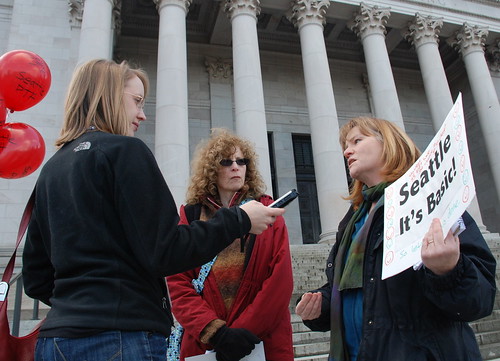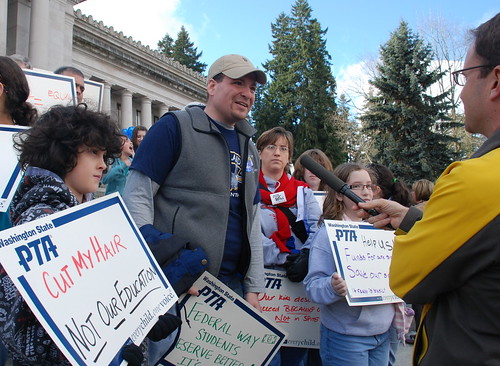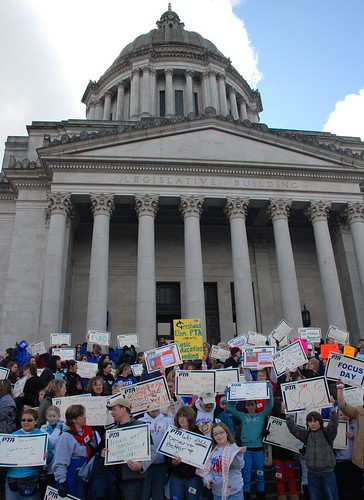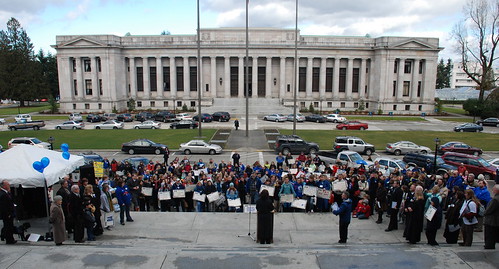HB 2261 – Why is it important and what are the details?
This informational sheet was compiled by Ramona Hattendorf of the Seattle Council PTSA. It is intended as an overview only. Detailed information on HB 2261 and other education funding bills can be found on the Washington State Legislature’s web site at www.leg.wa.gov.
Why 2261? The financial reason
School districts are going bankrupt. They were racing toward collapse last year BEFORE the economy took a dive.
Why the crisis?
Partly because state funding for schools wasn’t keeping up with inflation and things like fuel and energy costs. Mainly, though, it didn’t align with what kids need and wasn’t covering enough instructional hours. About 80 percent of school funding pays for staff.
• Example 1: Districts are paying for 22 percent more teachers than the state funds
• Example 2: Textbooks are funded on an 18-year cycle
• Example 3: In 2006-07, districts spent $500 million more on overhead costs than the state allotted for. That figure doesn’t include transportation. For utilities alone, districts spent $259 million. The state only paid $118 million.
• Example 4: The state only pays for five periods. Kids need six to get the credits they need for college.
Districts have been using their local levy dollars to pay for what the community would regard as basic expenses. Those levy dollars are legally intended for enhancement only and are capped. In other words: Districts can’t ask local tax payers to just pick up the bill, and they are limited financially in how they can address things like remediation, tutoring, enrichment and training. Levies are also unstable; if they fail, essential school funding is lost.
Districts are also limited in how much they can pay teachers. The state sets the salaries, and there is no adjustment for regional cost of living. Districts have a little leeway to supplement pay, but that money comes from the “enhancement dollars.” Paying teachers a decent salary competes with programs to get and keep students on track.
By law, the state (as opposed to local government) has to fund “basic education” for K-12 and needs to ensure “equitable” schools. The constitution also says it is the state’s “paramount duty” to make “ample provision for the education of all children residing in its borders.”
Why 2261? The student success reason
Statewide, we have a 30 percent drop out rate. This is actually par for the course nationally. In Seattle, the drop out rate is 37 percent. In Yakima, it’s 36 percent. In Spokane, it’s 42 percent.
Of the 63 percent in Seattle that do graduate on time:
• Only 17 percent (1 out 6) can meet the requirements for a four-year college.
• The rest either don’t have enough credits or haven’t taken the right courses.
Statewide, only 19 percent of ninth-graders will go on to earn a post-secondary degree.
In our increasingly competitive economy, we are graduating a majority of kids without the math, science and language skills they need to get good-paying jobs or pursue higher education or advanced training.
What would 2261 do?
• Redefine “basic education” as “the opportunity for students to graduate with a meaningful high school diploma.”
• Create a “prototypical school” funding model. In other words, identify everything an average school needs – including librarians, books, nurses, counselors, overhead costs, etc. – and use that to determine how much money the state sends to districts.
o How the money is actually spent would be up to the districts so they can best address local need.
The House version of 2261 includes:
• Preschool for high-risk kids, so they start school ready to learn
• Continued roll out of all-day kindergarten
• Reduced class sizes K-3rd grade to make sure kids are prepared for more rigorous courses later
• Enhanced allocations for low income, bilingual kids
• Allocation for highly capable
• Core 24 – This aligns high school requirements with college and employer requirements. It’s a basic college-prep curriculum that gives students some flexibility to tailor to their needs
• Six periods in middle and high school
• Establishes a board to adopt standards for effective teaching and assessment for professional certification, and to define a “master” level educator
• Directs State Board of Education to continue work on school and district accountability
• Dedicates 50% of revenue growth over 5% to fund basic education. Implementation of the expanded definition of basic education would be phased in 2011 – 2016.
Who supports 2261?
2261 follows an earlier bill, 1410. HB 1410 would have fully implemented the Basic Education Finance Task Force proposal. It died, and 2261 was introduced as a scaled-back compromise that addressed concerns of educators.
Supporters include:
• The Washington PTA and Seattle Council PTSA endorsed the task force proposal and have testified in support of 2261
• So has a group of 35 superintendents representing Puget Sound districts, including Seattle
• Superintendent of Public Instruction Randy Dorn, and State Board of Education President Mary Jean Ryan
• The Seattle School Board endorsed 1410, as did school boards and PTAs from across Washington
• The League of Education Voters also supports
Who opposes 2261?
The Washington Education Association (teachers union).
In testimony, WEA said the bill is a distraction and could lead to more unfunded mandates. Individuals have testified about changes to the salary structure. There is debate about linking a “master” teaching level to National Board Certification; currently teachers are paid more for advanced degrees.
There was an earlier bill backed by the Full Funding Coalition, a group of educators that included superintendents, administrators and the WEA. That bill died. Educators have testified in favor of 2261 but have reiterated the need to specify and commit funding.
Status as of April 15:
2261 was passed by the House 71-26. The Senate changed the bill. The PTA supports the original House version.
Washington State PTA stance:
Washington schools need ESHB 2261 passed this session.
• Proposed budget cuts will drive many more districts to the brink of financial crisis. Schools will be forced
to lay off several thousand newly recruited teachers. Class sizes will rise. Every special program will be slashed or eliminated.
• As the state’s economy recovers, ESHB 2261 is the blue print we need to rebuild a stronger K-12 system.




